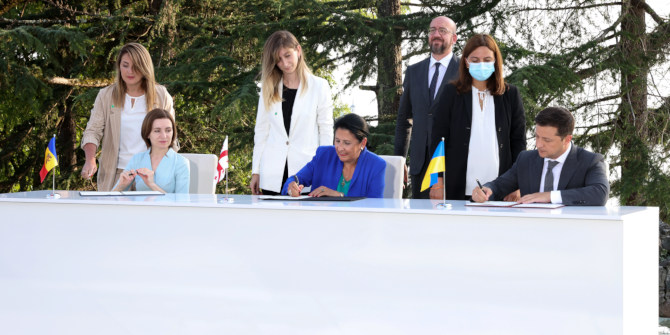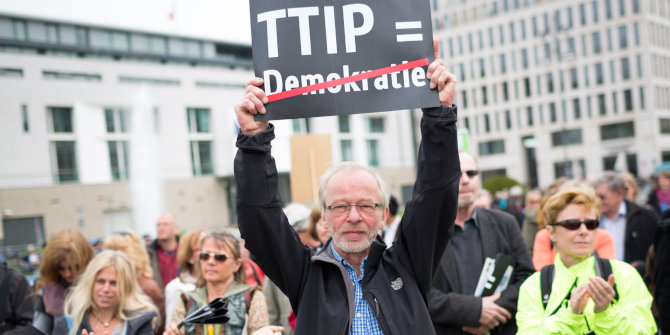 Morocco announced at the end of February that it was suspending ties with the European Union. The statement was issued following a ruling by the European Court of Justice that an EU-Morocco trade deal was illegal on the basis that it included the territory of Western Sahara. Luigi Lonardo writes that while the ruling is currently being appealed, the incident illustrates some of the dangers of the EU’s judiciary playing an active role in reviewing diplomatic and foreign policy issues.
Morocco announced at the end of February that it was suspending ties with the European Union. The statement was issued following a ruling by the European Court of Justice that an EU-Morocco trade deal was illegal on the basis that it included the territory of Western Sahara. Luigi Lonardo writes that while the ruling is currently being appealed, the incident illustrates some of the dangers of the EU’s judiciary playing an active role in reviewing diplomatic and foreign policy issues.
Managing EU Foreign Policy is no easy task, but a recent ruling by the European Court of Justice has added to this difficulty. A decision made by the General Tribunal, the lower tier of the EU judiciary, sparked an intense reaction in Morocco. As a consequence, Rabat announced the suspension of official contacts with the European Union at the end of February.
A ‘diplomatic accident’
The incident began in December 2015, when a ruling of the General Tribunal invalidated the EU’s agricultural trade accord with Rabat in so far as, and this is crucial, it included the disputed territory of Western Sahara. In essence, the Court decided that Morocco cannot bind Western Sahara, and it was this interpretation that generated the country’s resentment at the stance of the Court.
On the one hand, the incident serves as a warning of the problems the EU’s judiciary may create for diplomats. This is all the more pertinent given the Court of Justice is currently weighing up a decision over EU sanctions against the Russian oil company Rosneft: a case that may hugely broaden the Court’s jurisdiction on foreign policy matters.
In terms of relations with Morocco, however, the net effect was that the Moroccan government issued a communication on 25 February stating that the Prime Minister, Abdelilah Benkirane, had notified the EU’s Ambassador in Rabat that Morocco rejects the General Tribunal’s ruling. The communication indicated that Morocco views the ruling as being contrary to international law and UN Security Council resolutions.
EU-Moroccan agricultural trade in 2015 amounted to 43 billion dirham ($4.6 billion), but the real issue at the heart of the disagreement is the status of Western Sahara. Morocco’s declaration states that the country “cannot accept to be treated as a subject of a judicial process and to be buffeted between European institutions”, while also noting that “continuing in that position would deeply threaten the mutual trust and even the continuation of the partnership between the two sides.”

The ruling, if the issued statement gives any guide, appears to be viewed within Rabat as challenging the sovereignty of the country. As the statement indicates: “These things have to be clear for Europeans: we are not trying to mingle in their justice, but they have to reconsider all the parameters, since it’s a geo-strategic issue”. The suggestion is that the Court has not demonstrated the political sensitivity expected from a political institution. But perhaps a more important questions is whether this diplomatic accident could have been avoided if the matter had not ended up in the hands of judges in the first instance.
The day after Morocco issued its communication, the European External Action Service, the diplomatic body of the EU, reacted with a statement of its own. It emphasised that the decision of the Tribunal has been appealed and that the EU will fully cooperate in order to “answer Morocco’s preoccupations”. The appeal is currently pending before the European Court of Justice and it was confirmed that the EU would maintain “its relations with Moroccan authorities” in the immediate aftermath.
Hassan II (who was King between 1961 and 1999) once said that Morocco is a tree with its roots in Africa and its branches in Europe. The Kingdom is the largest recipient of funds in the framework of the European Neighbourhood Policy, and thanks to a 2008 Advanced Status Agreement it is the EU’s “closest neighbour” in terms of integration.
However, relations between Brussels and Rabat have gone through tense moments in the past. For example, in July 2002 there was a skirmish with Spain: the “Perejil crisis”. Moroccan soldiers occupied the small rocky and inhabited island of Perejil, a few yards off the Moroccan coast, but formally belonging to Spain. One week later, the Spanish navy retook the island without Moroccan soldiers offering resistance. In that case everything was resolved by traditional diplomacy. Which, of course, includes the military.
The perils of a ‘judge-led’ foreign policy
The Morocco case raises a wider question: what happens when diplomacy is no longer the exclusive domain of politicians and diplomats, but is instead shaped by the decisions of courts? As noted above, the European Court of Justice is due to rule shortly on another highly salient issue, namely the EU sanctions against Russian companies which were established in 2014 following Moscow’s alleged involvement in Crimea.
A series of such cases is currently being discussed before the Court, which is being asked to rule on both sanctions and foreign policy acts. Article 24 of the Treaty on European Union expressly states that the Court of Justice should not have jurisdiction with respect to the provision of the EU’s Common Foreign and Security Policy (which includes political international relations of the EU, but not trade, or economic sanctions). Admittedly, this is nothing new: the Court has long been accused of ignoring the limits placed on it by the treaty framework and expanding its mandate through its own rulings. But its new engagement in issues of foreign policy implies some fairly troubling implications for the EU moving forward.
The Morocco incident illustrates that some matters are simply too politically sensitive to be shaped directly by the judiciary. Indeed, in such cases it can often be counter-productive for courts to touch upon the topic, far less make pivotal judgments. The recognition of a foreign state is clearly one such domain that would be better left to diplomats to produce a resolution. This is why in most cases judicial review does not – or at least should not – assess the merit of discretionary political decisions. State recognition is undoubtedly a political decision that should be beyond the realms of courts to review in most cases.
This principle has been illustrated before in the context of the United States. In its landmark decision, US v Pink, the US Supreme Court invalidated a New York Statute which jeopardised the recognition of the Soviet Union by the US. The Court did so because it referred to the principle best expressed by Justice Sutherland in US v Belmont: “the conduct of foreign relations [is] committed by the Constitution to the political departments of the government, and the propriety of what may be done in the exercise of this political power was not subject to judicial inquiry or decision; that who is the sovereign of a territory is not a judicial question, but one the determination of which by the political departments conclusively binds the courts”.
This is not to say that foreign policy decisions should not respect the “rule of law”. Nor that any judicial control should be forfeited. It is necessary to ensure that procedural requirements are respected in how the choices are made. But the incident between the EU and Morocco brings to light the inherent tension between two logics: those focused on law and those focused on international politics.
On the one hand there is a court that advances “the rule of law” as a fundamental principle on which the EU is based. Under this logic, actors are constrained by legal considerations, and their choices are amenable to judicial review. On the other hand, there is the realm of international society, where, with the words of Benkirane, “all parameters should be reconsidered”, for the stakes are high. And diplomacy, to use the words of Justice Frankfurter in US v Pink, remains “characteristically delicate and elusive”.
Please read our comments policy before commenting.
Note: This article gives the views of the author, and not the position of EUROPP – European Politics and Policy, nor of the London School of Economics.
Shortened URL for this post: http://bit.ly/1M2eEfY
_________________________________
 Luigi Lonardo – King’s College London
Luigi Lonardo – King’s College London
Luigi Lonardo is a PhD candidate at King’s College London.






It’s even more ludicrous than stated in the Morocco vs EU case. A Rebel Entity (not recognized as a state by the UN) made the claim at the EU courts and got accepted ! What’s to hold Daesh from proceeding legal arguments against it’s neighbors too at the Europeans Courts????
I think the court recognises that the Western Sahara is still, and by no means, solely under Moroccan jurisdiction. Aside from the, still unheld, UN-sanctioned referendum concerning the will and nationality (inhabitants were Spanish citizens before the Green March) of the Sahrawi people, official sovereignty of the territory still lies with Spain, not Morocco, regardless or Rabat’s insistence, and Madrid’s despondence.
So the EU should be allowed to act outside of international law? This article is itself perilous. Buying and selling the natural resources of an illegally occupied country without the consent of the occupied population constitutes the war crime of plunder. So now we think the EU should be allowed to commit plunder? International laws, and the courts that uphold them, are there for a reason. As for the comment from “Halifax”, what you call the “rebel entity” is the legitmate representative id the Saharawi (indigenous people of Western Sahara, who have suffered a brutally violent Moroccan occupation for the last forty years, an occupation funded by trade agreements such as the one under question), as recognised by the U.N.
What a great idea you’re suggesting Luigi!
Let’s give politicians and diplomats unlimited authority to do whatever they want without the oversight of any justice system, court, or judge. I think you forgets that that exact thing that you’re trying to defend is the mother of all big-fat mess-ups like Irak and Afghanistan, not to mention the other conflicts…
Western Sahara is the last colony in Africa, refer to the UN’s list of NSGT, and the International Court of Justice ruled in 1975 that Morocco has no ties to the country, nor Mauritania.
Check The Guardian’s brief article regarding the -according to international law unethical and illegal- EU-Moroccan agreements that include the Occupied Territories of the Western Sahara.
http://www.theguardian.com/world/2015/mar/04/western-sahara-conflict-tomatoes-occupation-morocco-labelling-tax